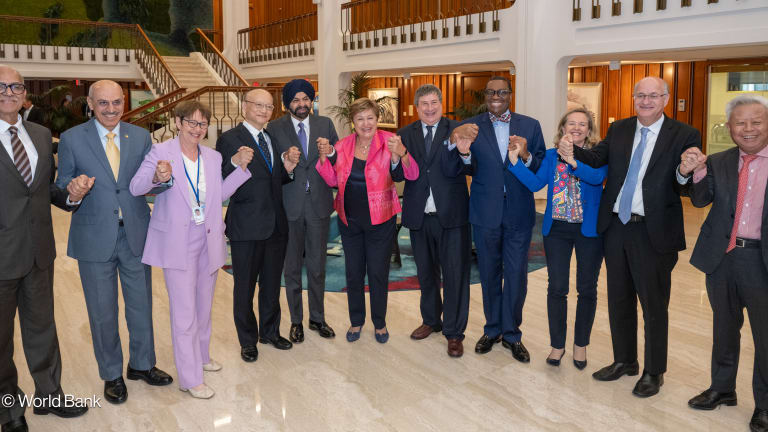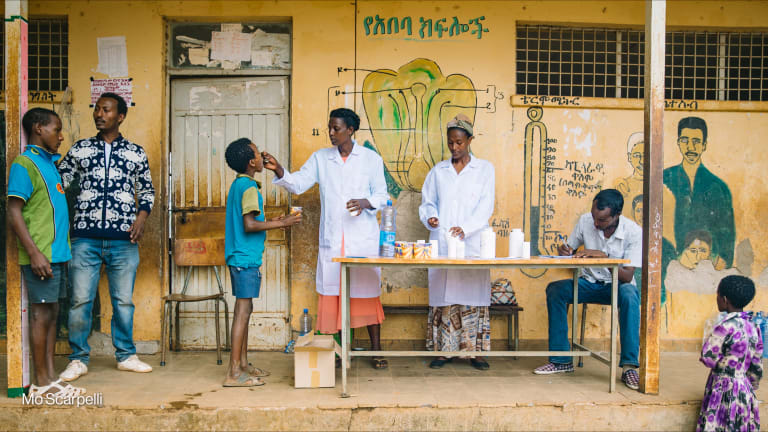
Health organizations can’t be expected to transform overnight.
Though that sounds like common sense, the COVID-19 pandemic left countries around the world scrambling for instant results, with life-or-death consequences.
It highlighted the gaps and inefficiencies in nearly every part of the global system, especially in the capacity of health organizations to respond with the speed, agility, and precision expected by an anxious public. Because strengthening our institutions takes time, today is a perfect opportunity to begin these investments, so our world will be better prepared for the next pandemic.
Delivering meaningful change requires a long-term perspective. Investing in people and institutions can feel like a risk since the key performance indicators seem less quantifiable. But when a central institution is strong, supported, and streamlined, then quantifiable outcomes will follow.
Just a few years before the pandemic, the Nigeria Centre for Disease Control didn’t have a national laboratory, and the country’s outbreak surveillance system to protect 206 million people was based on paper notes from the country’s federal states.
It was able to become a much higher-functioning national health organization, especially during the COVID-19 crisis, only after an institution-building journey. Informed by the many lessons learned from the responses to the outbreaks of Ebola and Lassa fever in 2016, NCDC began work on a new strategy that involved building leadership capacity, investing in support functions like information technology and human resources, and creating an implementation plan.
Ultimately, working on organizational change within existing national health services will make institutions stronger, more resilient, and able to deliver greater impact.
—By focusing on these key actions, funders, policymakers, political leaders, and public health workers can be better prepared for future global health crises:
1. Bolster existing systems
When given the opportunity to invest in lower-functioning government systems, the prevailing development model had been to build parallel systems or depend on implementing organizations from the private or not-for-profit spheres. While this may garner short-term wins, with donors’ short-term objectives apparently met, it is inadequate when emergency responses are needed again in five, 10, or 20 years.
Taking ownership over a resilient health system comes from building the institution from within, rather than adding the undue complexity of competing systems. For example, Nigeria was able to use the emergency operation centers that were set up during polio in 2012 to respond faster to Ebola; now with the expansion of NCDC’s centers, the COVID response has been far more effective because it could draw from existing infrastructure.
2. Fund support functions
Funding often exists to deliver a specific program result, but funders don't think enough about what the institution will require to carry that work forward longer-term. Improvements to HR, IT, and communications departments are unglamorous but create an environment where people can do their best work — the “silent” pieces of success. Taking the time to build systems today means that when a crisis hits, organizations can scale up existing systems rather than trying to create new ones from scratch during an emergency.
A few years ago, the NCDC website was unusable and staff even lacked official email addresses. Investing in the IT team meant addressing those issues, plus rolling out new digital disease surveillance software to 17 states — making it much easier to expand to all 37 regions when COVID-19 arrived. With the shared surveillance software and communication improvements to its website and social media, Nigeria’s COVID-19 data has been shared every single night since the beginning of the pandemic.
3. Build your network – and tap into it
Even visionary leaders can’t reform an organization by themselves. Leaders have a responsibility to use their own network, augmenting it appropriately where doing so will help their institution, enabling them to consult people they know and respect for help or opportunities.
Q&A: Build ‘better, bolder, and bigger’ health systems, says Africa CDC
COVID-19 has highlighted the need for resilient health systems that can withstand the pressure of future pandemics. Dr. John Nkengasong weighs in on the role of local manufacturing and workforce development in building regional resilience.
Apart from helping you do more with less, your existing network can help create a sense of a shared mission and participation in your organization’s success. At NCDC, that meant asking partners for pro bono advice to get ideas off the ground and checking whether they could provide team members with the opportunity to visit and learn from them. Taking these steps yields results.
By the time the pandemic hit, NCDC had established a national lab, emergency operation centers in 12 states, and real-time disease surveillance software running in half of its 37 states.
Countless lives were saved, a testament to the difference strong national health organizations across the globe can make to pandemic control. NCDC is proof that development partners and policymakers can maximize their impact by prioritizing helping existing organizations become more effective, rather than simply focusing on more glamorous last-mile investments.
Ultimately, working on organizational change within existing national health services will make institutions stronger, more resilient, and able to deliver greater impact. As development partners, policymakers, and governments plan their response to the next stage of the pandemic, we should collectively and deliberately consider how to bolster systems and support institution-building — and seize the opportunity to do so while the requisite political will exists.
Visit the Building Back Health series for more coverage on how we can build back health systems that are more effective, equitable, and preventive. You can join the conversation using the hashtag #BuildingBackBetter.










